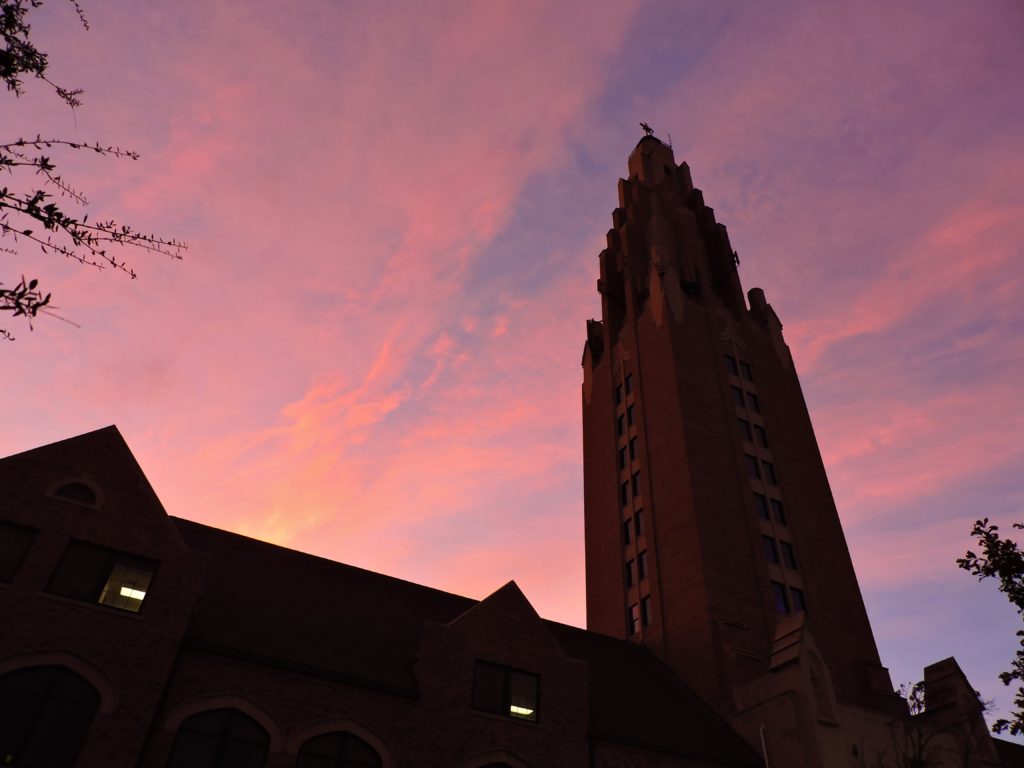
Nothing quite captures the fall spirit like Cartoon Network’s animated series “Over the Garden Wall.” For anyone who hasn’t seen it, it just turned six years old this season and is a must-watch for anyone seeking autumnal or cottage-core vibes to complement their post-Halloween, pre-winter spirit.
The series follows two brothers, “Wirt,” the older brother voiced by Elijah Wood, and “Greg,” the younger brother voiced by Collin Dean. The two brothers seek a way home as they wander through the surreal and ominous land called only “The Unknown” and flee from a being enshrouded in darkness called “The Beast.” Each episode of the 10-part series is 11 minutes long, so it makes for a perfect weekend night binge when the moon is high and the air is just on the brink of chill.
But the true beauty of “Over the Garden Wall” comes from the show’s penultimate episode twist, which redefines the themes of the show in a darker, somber light. So, if you haven’t watched the show, find a friend with a Hulu account and schedule a watch party before reading the rest of this piece, because it’s all spoilers from here.
In the penultimate episode, it is revealed the brothers are actually normal kids from our world. They have normal lives in a normal house in a relative average suburbia of the (presumably) 80s. They fell into a frozen lake on Halloween, and The Unknown is a liminal space between our world and an afterlife.
Up until this point, the show had been filled with macabre images and themes. From a ghoul possessing a young woman, to a town filled with skeletons dressed in pumpkins, to the “Woodsman” who searches desperately for wood to fuel The Beast’s lantern, in which the Woodsman believes his daughter’s soul is being kept alight.
Normally, these images would simply be spooky set pieces for the setting and tone of the show, but letting the viewers know the brothers are sinking in a lake recontextualizes these images. While the images could initially have been taken as part of a real, but fantastical, setting, the new information defines the brothers as something real in a surreal land, separating them from the members of The Unknown and making their journey toward darkness even more solemn and horrific.
Even the song that plays over this revelation, “Old Black Train” by The Blasting Company, tells the audience the brothers don’t belong in The Unknown.
“There’s an old black train a-coming / scrapin’ ‘long the iron / You don’t need no ticket, boys / It’ll take you when it’s time. / Now, come on now, young strangers / Weren’t you someone’s son? How’d you find this depot? / ‘Cause it ain’t where you belong,” the lyrics read.
If the brothers aren’t a part of The Unknown and the afterlife, their story changes from a fantasy story about a hero’s quest to journey home and becomes a poignant reflection on responsibility.
The characters of “Over the Garden Wall” have passed, sometimes literally, into archetype and symbolism. The Unknown gives them a place to exist and a place to be content after their time on Earth is done. They belong somewhere else now, somewhere they can go on new journeys or be content in their existences.
In the brothers’ final confrontation with The Beast, Wirt realizes The Beast’s lantern is a lie, and it does not contain the Woodsman’s daughter’s soul. Instead, it is a source of power for The Beast, who convinces people to keep it alight by lying to them about its contents.
Only by defying The Beast do the brothers and the Woodsman manage to escape The Unknown and return to the world again. While The Beast could represent the possibility of death, the skeleton citizens of Pottsfield represent death in a far more literal way than The Beast. What The Beast does represent is a denial of circumstances.
The Beast targets Wirt and the Woodsman. Wirt has denied responsibility throughout the journey and repeatedly blamed Greg for their situation. The Woodsman refuses to believe his daughter may be dead. Both are desperate to preserve the fictions they have created for themselves. By taking The Beast’s lantern, they become a beacon of darkness, shining someone else’s light instead of their own and refusing to examine their own situation.
Defiance of The Beast is a form of acceptance. It is also self-actualizing. When Wirt saves Greg and decides to leave the Unknown, he is able to do so because he has accepted the reality he was trying to escape from when they fell into the lake. The Woodsman finally decides to accept the mortality of his daughter and extinguishes the lantern’s light, turning his back on The Beast and escaping The Unknown as well.
So, if you want a haunting tale about brothers trying to escape limbo, or a somber story about the need to accept mortality, visit The Unknown in “Over the Garden Wall.” Wander through the woods and enjoy the last turns of autumn before winter arrives and Hallmark reigns supreme.


Leave a Reply